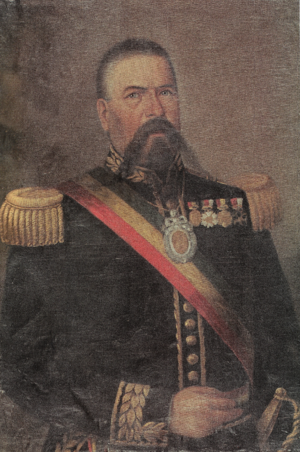Agustín Morales facts for kids
Quick facts for kids
Agustín Morales
|
|
|---|---|
 |
|
| 16th President of Bolivia | |
| In office 15 January 1871 – 27 November 1872 Provisional: 21 January 1871 – 25 August 1872 |
|
| Preceded by | Mariano Melgarejo |
| Succeeded by | Tomás Frías |
| Personal details | |
| Born |
Pedro Agustín Morales Hernández
11 March 1808 La Paz, Viceroyalty of the Río de la Plata (now Bolivia) |
| Died | 27 November 1872 (aged 64) La Paz, Bolivia |
| Cause of death | Physical quarrel |
| Spouse | Petrona López |
| Parents | Pedro Morales Antonia Hernández |
| Signature | |
| Military service | |
| Allegiance | Bolivia |
| Branch/service | Bolivian Army |
| Rank | General |
Pedro Agustín Morales Hernández (born March 11, 1808 – died November 27, 1872) was an important Bolivian military leader. He became the 16th president of Bolivia and served from 1871 to 1872.
Early Life and Challenges
Agustín Morales was born in the city of La Paz. When he was younger, he supported President José Ballivián. However, after Ballivián was removed from power in 1847 by General Manuel Isidoro Belzu, Morales became a strong opponent of Belzu.
In 1850, Morales was a Colonel in the army. He was involved in a plan against President Belzu. This plan did not work, and Morales had to leave Bolivia. He went to Peru and stayed there for some time. He returned to Bolivia after President Jorge Córdova was no longer in charge.
Rise to Power
After many years of political struggles, Morales joined forces with President José Maria Linares in 1857. Later, he disagreed with the government of General José Maria de Achá. Achá had taken power from Linares.
In 1864, Morales supported a change in government that brought General Mariano Melgarejo to power. Melgarejo rewarded Morales by making him a General. He also gave him command of the Bolivian Army.
Melgarejo's time as president lasted six years. It was known for being very strict and unpopular. Many people in Bolivia were against his rule. Eventually, General Morales decided to switch sides. He brought together different groups who were fighting against Melgarejo.
In January 1871, Morales led a movement that removed Melgarejo from power. People in Bolivia were very happy about this change. They felt like they were waking up from a bad dream. They hoped things would return to normal and be better.
After becoming president, Morales canceled many of the changes Melgarejo had made. However, Morales also made some very strong decisions during his time as leader. For example, he closed the national congress in 1872. He died later that year after a disagreement.
See Also
 In Spanish: Agustín Morales para niños
In Spanish: Agustín Morales para niños
 | Aurelia Browder |
 | Nannie Helen Burroughs |
 | Michelle Alexander |

